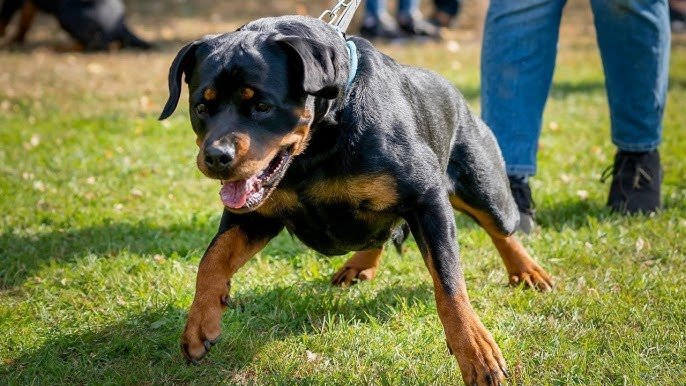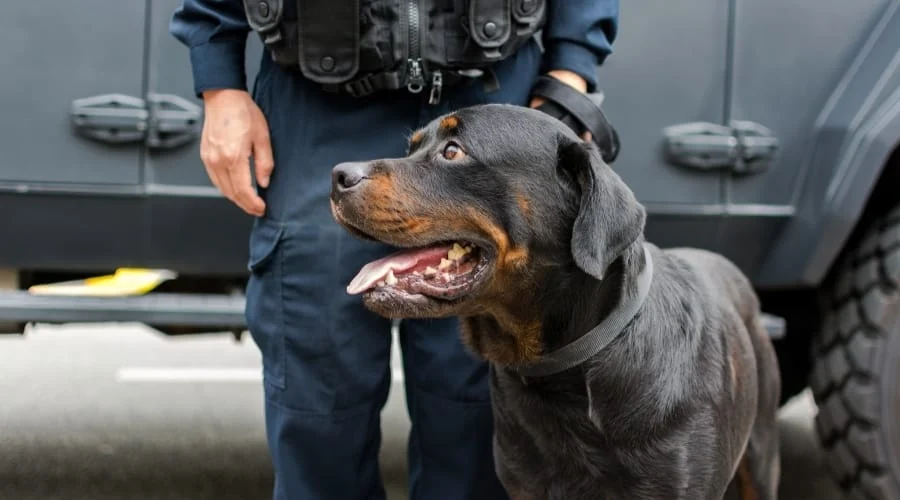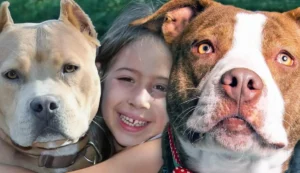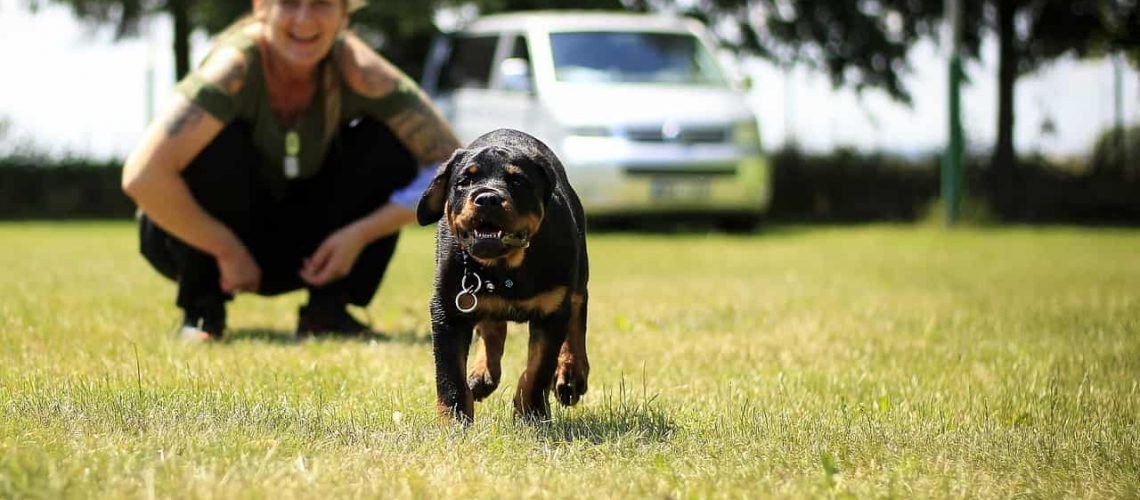
How to Socialize Your Rottweiler to Avoid Behavioral Issues
Rottweilers are intelligent, loyal, and protective dogs that make excellent family companions. However, if they’re not properly socialized from an early age, they can develop behavioral issues such as fear, aggression, or anxiety. Socializing your Rottweiler is crucial to ensuring they grow into well-mannered and confident dogs that interact peacefully with people, other pets, and new environments.
In this guide, we’ll explore the importance of socializing your Rottweiler and provide step-by-step advice on how to do it effectively to avoid common behavioral issues.
Why Socialization Is Crucial for Rottweilers
Rottweilers are naturally protective and territorial dogs, which makes early socialization even more important. Without proper exposure to different people, animals, and environments, they may become overly aggressive, fearful, or suspicious of new things, which can lead to behavioral issues such as:
- Fear-Based Aggression: Rottweilers may react aggressively to unfamiliar situations or people if they are not properly socialized.
- Separation Anxiety: A lack of socialization can cause your Rottweiler to become overly attached to their owner, leading to anxiety when left alone.
- Over-Protectiveness: If not properly socialized, Rottweilers may become too protective of their family, which could lead to issues with guests, strangers, or other animals.
Socialization helps prevent these issues and ensures that your Rottweiler develops into a well-adjusted, balanced dog that is comfortable in a variety of situations.
1. Start Early: The Critical Window for Socialization
The ideal time to begin socializing your Rottweiler is during their puppyhood, typically between 3 and 14 weeks of age. During this period, puppies are more receptive to new experiences and interactions. However, if you’ve adopted an older Rottweiler, don’t worry—socialization can still be successful, though it may take more time and patience.
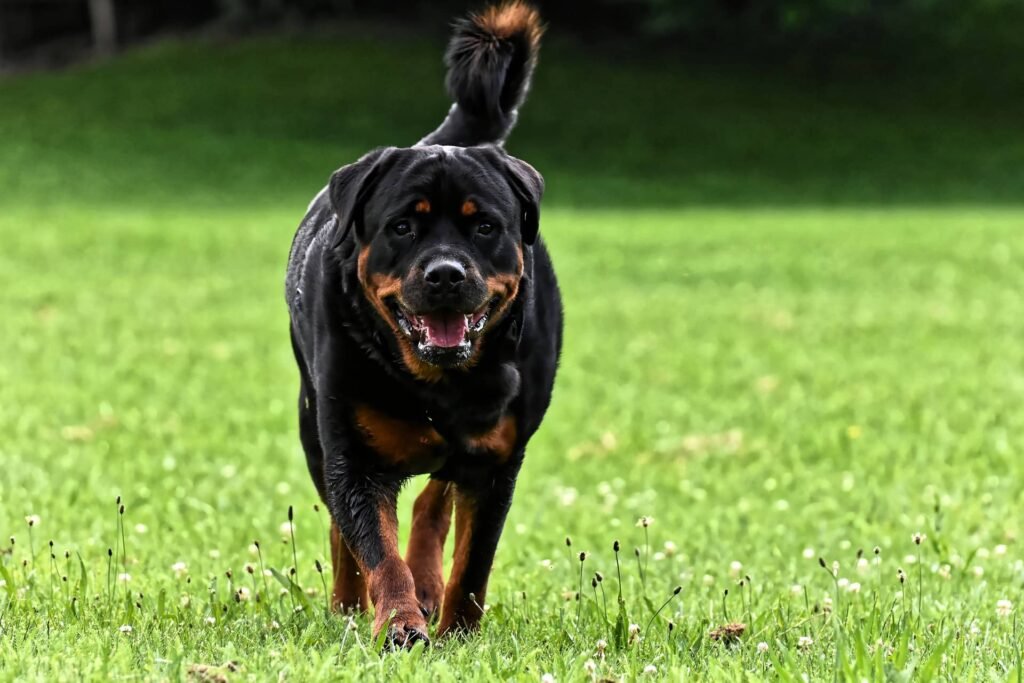
Puppy Socialization:
- Exposing Them to Different Environments: Introduce your puppy to various environments such as parks, busy streets, and different rooms in your house. This will help them become accustomed to new sights, sounds, and smells.
- Meeting New People: Ensure your puppy meets a variety of people, including men, women, and children of all ages. This will prevent them from becoming fearful or aggressive toward strangers later in life.
- Interacting with Other Dogs: Arrange playdates with well-socialized dogs. This helps your Rottweiler learn how to interact with other dogs and develop appropriate canine communication skills.
2. Use Positive Reinforcement
Positive reinforcement is a powerful training tool, especially when socializing your Rottweiler. Rewarding desirable behavior with treats, praise, or toys helps your dog associate new experiences with positive outcomes.
- Reward Calm Behavior: Whenever your Rottweiler behaves calmly in a new or challenging situation, reward them. For example, if they meet a new person or dog without showing signs of fear or aggression, give them a treat or lots of praise.
- Avoid Punishment: Negative reinforcement can lead to fear or anxiety, which can worsen behavioral issues. Instead, focus on encouraging positive behaviors and redirecting unwanted ones.
- Consistent Training: Socialization is an ongoing process. Consistently expose your Rottweiler to new experiences and reward positive responses. Over time, your dog will build confidence and learn how to behave in different environments.
3. Gradual Exposure to New Experiences
Socializing your Rottweiler doesn’t mean overwhelming them with too much too soon. Gradual exposure is key to ensuring that your dog is comfortable and confident as they experience new people, dogs, and places.
- Pacing Introductions: Start with less stimulating environments (like quieter parks or calm neighborhood walks) and slowly increase the level of distractions. If you overwhelm your dog, they may become fearful or stressed, which can lead to undesirable behaviors.
- Short Sessions: Keep initial socialization sessions short, especially with puppies. Allow your Rottweiler time to adjust and process each experience before moving on to the next.
- Controlled Encounters: When introducing your Rottweiler to new people or other dogs, keep things calm and controlled. Use a leash for safety, and never force your dog into situations they’re not comfortable with.
4. Exposure to Other Animals
Rottweilers, like all dogs, need to learn how to interact with other animals to avoid potential aggression or territorial issues.
- Socialize with Other Dogs: Arrange for your Rottweiler to meet well-mannered, friendly dogs in a controlled environment. This will help them learn how to communicate and play appropriately.
- Introduce Other Pets: If you have other pets at home, begin introducing them gradually. Supervise these interactions closely and ensure that each animal has their own space to retreat to if needed.
- Reinforce Positive Interactions: Reward your Rottweiler when they interact calmly with other animals, even if it’s just a brief encounter.
5. Handling New Situations and Experiences
Besides meeting people and other animals, it’s important to expose your Rottweiler to new experiences like different sounds, surfaces, and environments. This will help them adapt to new situations without fear or anxiety.
- Car Rides: Get your Rottweiler used to riding in a car by taking short trips to enjoyable places like the park or pet store. This helps them become more comfortable with traveling.
- Unusual Surfaces: Introduce your Rottweiler to various surfaces, like tile floors, gravel, or grass. This is especially important if they’re not used to walking on different terrains.
- Loud Noises and Distractions: Gradually introduce your dog to common noises such as the vacuum, thunder, or fireworks. If they show signs of fear, provide reassurance and positive reinforcement to help them stay calm.
6. Puppy Classes and Professional Training
Enroll your Rottweiler in puppy kindergarten or obedience classes with a certified dog trainer. These classes provide valuable socialization opportunities with other dogs and people in a controlled environment.
- Group Classes: Group training classes give your Rottweiler the chance to interact with other dogs under the supervision of an experienced trainer. These classes often focus on basic obedience skills, which can help establish good behavior early on.
- Private Sessions: If you have concerns about your Rottweiler’s behavior or feel that they need more personalized attention, consider hiring a professional trainer for one-on-one sessions.
7. Ongoing Socialization and Maintenance
Socialization is not a one-time event but an ongoing process. Continue exposing your Rottweiler to new experiences, people, and animals throughout their life to maintain their confidence and prevent behavioral issues from arising.
- Regular Outings: Take your Rottweiler to new places, such as pet-friendly cafes, dog parks, or pet stores. This helps them stay comfortable in unfamiliar environments and reduces the risk of developing anxiety.
- Meet New People: Regularly expose your dog to new people, especially those who may not be around your Rottweiler often (e.g., neighbors, visitors, or strangers). This helps them stay calm and comfortable with unfamiliar faces.
Conclusion: The Benefits of Proper Socialization
Properly socializing your Rottweiler is key to raising a well-behaved, confident, and happy dog. Early socialization reduces the likelihood of fear, aggression, and other behavioral issues, making them more adaptable to new situations and people.
With patience, positive reinforcement, and consistent exposure to new experiences, your Rottweiler will become a well-adjusted companion who is comfortable in any environment. Socialization is an investment in your dog’s future happiness and well-being, so start early and continue throughout their life to ensure they grow into the best version of themselves.
